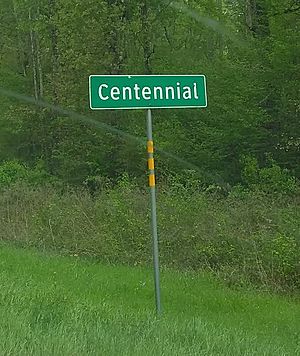Centennial, Texas facts for kids
Quick facts for kids
Centennial, Texas
|
|
|---|---|

Centennial, Texas road sign
|
|
| Country | United States |
| State | Texas |
| Parish/County | Panola County, Texas |
| Founded | 1850 |
| Elevation | 328 ft (100 m) |
| Time zone | UTC-6 (CST) |
| • Summer (DST) | UTC-5 (CDT) |
| Area code(s) | 903 |
Centennial is a small, unincorporated community located in Panola County, Texas, in the United States. It's found along FM 123. An unincorporated community is a place that isn't part of an official city or town government.
Contents
History of Centennial
Centennial was established a long time ago, even before the year 1850. The community's very first school opened its doors in 1867. This building also served as a church, known as Centennial ME Church. In those days, it was a school for white children and a place of worship for white individuals.
Centennial's Post Office
Centennial had its own post office from 1875 until 1913. On November 30, 1913, the post office closed. Mail for Centennial was then sent to Midyett, Texas. Today, the community gets its mail from the Deberry, Texas, post office.
Harmony Church's Story
In 1904, a church called Harmony Colored Methodist Episcopal Church was started. It was founded by three people: George Delaney, Albert Perkins, and William Townley. Later, the church moved to land that George Delaney bought and owned.
During this time, the church property was a very important place for the African American community. It was used as:
- A school for African American children
- A meeting place for the Prince Hall Mason Lodge
- A meeting place for the Eastern Star
- The starting point for the East Texas Burial Association and Funeral Home
In 2010, the church changed its name to Harmony Invisible Network. This happened after the church leaders decided to leave the Christian Methodist Episcopal Church. The next year, a group called SJM Group bought the land. They then renamed the church Harmony Centennial Methodist Evangelistic Church.
The Community Cemetery
The Centennial Cemetery was set up in 1858. This cemetery was historically divided into two sections. One side was for white individuals, and the other, called Centennial Afro-American Cemetery, was for African Americans.
According to Allee Simmons Jacobs McNamee, who is a historian for the community, the early days of the African American cemetery were unique. Family and friends of the person who had passed away would dig the graves themselves. They would also make homemade caskets. People would walk in a procession to the cemetery, carrying the casket. Later, mules were used to pull the casket.
The deceased were buried the next day with their heads facing east. This burial practice was used because many enslaved people believed they would find freedom after death. This position was thought to prepare them for when the angel Gabriel would sound his trumpet at the resurrection.
Instead of fancy headstones, people used broken plates, saucers, jars, and pitchers to mark the graves. At the graveside services, they would sing meaningful songs. Some of these songs included "Go Down Moses", "Swing Low, Sweet Chariot", and "Shine on Me".
In 2009, the Centennial Afro-American Cemetery received a special honor. It was named a Texas Historical Cemetery by the Texas Historical Commission. A group called the SJM Group worked hard to get this state recognition for the cemetery.
Centennial: A Village Community
Today, Centennial is known as a village community. This official recognition was given through the Texas State Historical Association. The SJM Group helped make this happen.
Centennial's Economy
Centennial is home to the Tyson Foods Centennial farm plant. Tyson Foods is a very large company. It is one of the top businesses that processes and sells chicken, pork, and beef.
 | Claudette Colvin |
 | Myrlie Evers-Williams |
 | Alberta Odell Jones |

